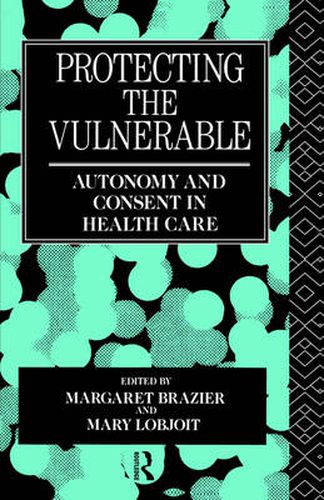Readings Newsletter
Become a Readings Member to make your shopping experience even easier.
Sign in or sign up for free!
You’re not far away from qualifying for FREE standard shipping within Australia
You’ve qualified for FREE standard shipping within Australia
The cart is loading…






This book explores the reality of patient control and choice in health care, and analyses how decisions should be made on behalf of those deemed incapable of making them for themselves. The contributors are distinguished experts from the disciplines of medicine, ethics, theology and law. They look at the complex problem of autonomy and consent in health care and clinical research today from an illuminating perspective, its impact on the vulnerable members of society. The essays move from the exploration of lingering paternalism in health care to the acute dilemmas of treatment of and research on new born babies. In covering both general and specific problems the collection reveals how exploitation can occur, when the right of autonomy is eroded and where informed consent is illusory. Particularly vulnerable groups, such as children and people with mental handicaps, are discussed alongside cases where the vulnerability is itself an issue. A study of attitudes to female sterilisation provides a vivid example of the problems of autonomy and consent. Other areas covered include: gesture’ suicides, the practical problems of doctors in dealing with dependent patients, and the limits of proxy consent.
$9.00 standard shipping within Australia
FREE standard shipping within Australia for orders over $100.00
Express & International shipping calculated at checkout
Stock availability can be subject to change without notice. We recommend calling the shop or contacting our online team to check availability of low stock items. Please see our Shopping Online page for more details.
This book explores the reality of patient control and choice in health care, and analyses how decisions should be made on behalf of those deemed incapable of making them for themselves. The contributors are distinguished experts from the disciplines of medicine, ethics, theology and law. They look at the complex problem of autonomy and consent in health care and clinical research today from an illuminating perspective, its impact on the vulnerable members of society. The essays move from the exploration of lingering paternalism in health care to the acute dilemmas of treatment of and research on new born babies. In covering both general and specific problems the collection reveals how exploitation can occur, when the right of autonomy is eroded and where informed consent is illusory. Particularly vulnerable groups, such as children and people with mental handicaps, are discussed alongside cases where the vulnerability is itself an issue. A study of attitudes to female sterilisation provides a vivid example of the problems of autonomy and consent. Other areas covered include: gesture’ suicides, the practical problems of doctors in dealing with dependent patients, and the limits of proxy consent.